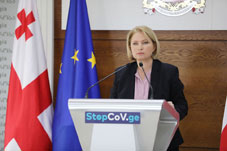
Prospects for further economic rehabilitation of COVID-19
By Natalia Kochiashvili
Thursday, April 23
TSU International School of Economics (ISET) and it’s Policy Institute held an online discussion panel ‘Prospects for Further Economic Rehabilitation of COVID-19’ focusing on the steps that countries, including small countries, should take in the post-conflict period.
Natia Turnava, Minister of Economy and Sustainable Development of Georgia, participated in the event. Among the speakers were Arup Banerji, Regional Director for the European Union for the World Bank Group, overseeing the World Bank’s operations and analytical work for the European Union member states; Martin Raiser, World Bank’s Country Director for China, Mongolia, and Korea, who is leading a team that is managing one of the World Bank’s largest loan portfolios and directs an extensive analytical and advisory program with China and Mongolia, and a growing knowledge partnership with Korea.
The seating discussed the examples of countries that have been relatively successful in dealing with the pandemic and have already begun the process of economic rehabilitation, including China, South Korea, Germany and Sweden. At the same time, it was emphasised that the case of each country is specific and depends on the size of the economy and the pre-crisis level of economic development, as well as the social environment.
Banerji singled out the 5 main steps that all countries need to take: 1. Universal quarantine 2. Mass testing 3. Monitoring of contacts of infected people 4. Isolation of people exposed as a result of establishing contacts 5. Treatment of patients.
“With the introduction of the universal quarantine, we will only temporarily alleviate the problem, and if we do nothing else, the disease will continue to plague us as soon as the quarantine is completed,” said Banerjee.
Raiser also thinks that there are high risks of the second wave of the epidemic, if we do not take all these steps and we cannot test, isolate and treat people very quickly, it will be very difficult to successfully implement the economic rehabilitation process.
According to Raiser, painful economic constraints and universal quarantine should be used to save time and to help both people and businesses. The process of economic rehabilitation must be gradual and very slow. It is advisable to initially remove the restrictions only for young people who are not at risk. It is also effective to test people on a random basis.
Turnava shared with the participants of the online panel the main emphases of the government plan to stimulate the economy and get out of the post-crisis period. According to her, diversification and transfer to different locations of production for business insurance will be a new trend.
According to the minister, today all countries, governments and international financial organizations together are creating a new history, a new experience of how to fight the virus and how to prepare their economy for active rehabilitation, after overcoming the challenge created by the Coronavirus.
Turnava announced that Georgia is ready to present itself in the global economy with a new role in the global market - as an alternative platform for business and large corporations to offer business here.
“Georgia is one of the most attractive in this regard - logistically, in terms of transparency or low taxes, and most importantly, if we overcome the current challenge more quickly and overcome the epidemic, it will give us an additional competitive advantage,” she explained.
ISET and its Policy Institute launched a Series of International Policy Panels online on April 21st. Online Policy Panels will bring together economists, policy makers, private sector leaders and academics from various world regions to discuss acute and challenging local and global policy issues and facilitate sharing best practices across regions.


